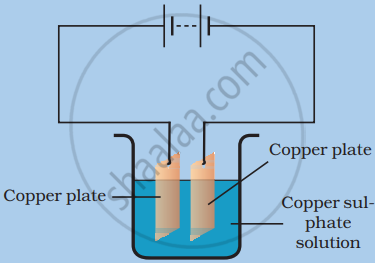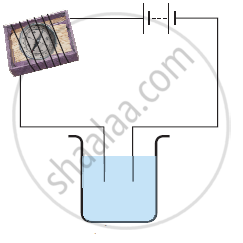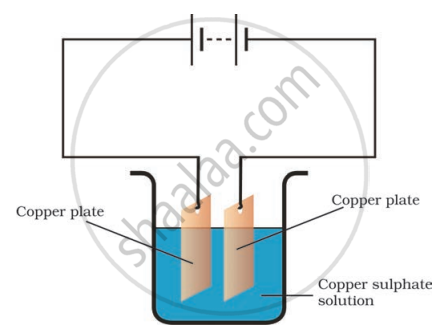Advertisements
Advertisements
प्रश्न
The process that you saw in the image is used for the purification of copper. A thin plate of pure copper and a thick rod of impure copper are used as electrodes. Copper from impure rod is sought to be transferred to the thin copper plate. Which electrode should be attached to the positive terminal of the battery and why?
उत्तर

The rod of the impure copper plate should be connected to the battery's positive terminal. Because when an electric current is sent through a copper sulphate solution, it separates into copper and sulphate ions. The free copper is drawn to the battery's negative terminal and deposited on it. On the other hand, the impure copper rod connected to the battery's positive terminal would gain back the copper lost in the solution.
APPEARS IN
संबंधित प्रश्न
The process of depositing a layer of any desired metal on another material by means of electricity is called ______.
Name three liquids, which when tested in the manner shown in Figure, may cause the magnetic needle to deflect.

In an electrolyte the current is due to the flow of ______.
Which of the following metals is used in electroplating to make objects appear shining?
One of the most common applications of chemical effect of electric current is ______.
Why is tin electroplated on iron to make cans used for storing food?
In the circuit given in the figure,
Boojho observed that copper is deposited on the electrode connected to the negative terminal of the battery.
Paheli tried to repeat the same experiment. But she could find only one copper plate. Therefore, she took a carbon rod as negative electrode. Will copper be still deposited on the carbon rod? Explain your answer.

The most common industrial application of chemical effects of electric current is ______.
______ is used in the extraction and purification of metals.
Match the following
| 1. | Anode | a. | Conducting solution |
| 2. | Cathode | b. | Positive terminal |
| 3. | Ions | c. | Negative terminal |
| 4. | Electrolyte | d. | Positively or negatively charged |
